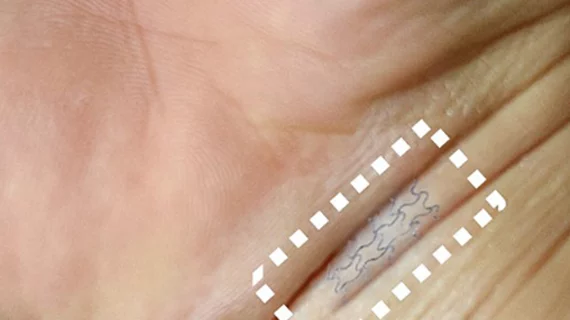A team of researchers have created a simpler version of electronic wearable devices that can be used for physiological monitoring and alert a user of any health risks in real time.
The “smart stickers” were developed by researchers at Purdue University in West Lafayette, Indiana. Their research about the stickers was detailed in a recent article published in ACS Applied Materials and Interfaces.
According to their study, traditional fabricated epidermal electronics for physiological monitoring and therapy are typically complex and expensive. To address the issue, researchers developed a fabrication of an epidermal, paper-based electronic device (EPED), which is inexpensive, stretchable and easy to apply.
“The omniphobic character and fibrous structure of EPEDs make them breathable, mechanically stable upon stretching, and facilitate their use as electrophysiological sensors to record electrocardiograms, electromyograms, and electrooculograms, even under water,” the study said. “EPEDs can also be used to provide thermotherapeutic treatments to joints, map temperature spatially, and as wirelessly powered implantable devices for stimulation and therapeutics.”
The smart stickers are made of cellulose, which is biocompatible and breathable. They’re also patterned with serpentine shapes, which makes it as thin and stretchable as skin. It’s also coated with molecules that repel water, oil, dust and bacteria.
Users can use the devices to not only monitor physical activity, but also to alert a wearer about possible health risks in real time. For example, an athlete who is wearing the technology can use it to monitor their health while exercising.
Additionally, the stickers cost about a nickel to produce and can be made using printing and manufacturing technologies.
“The low cost of these wearable devices and their compatibility with large-scale manufacturing techniques will enable the quick adoption of these new fully disposable, wearable sensors in a variety of healthcare applications requiring single-use diagnostic systems,” Ramses Martinez, Purdue University professor and lead researcher, said in a statement.

